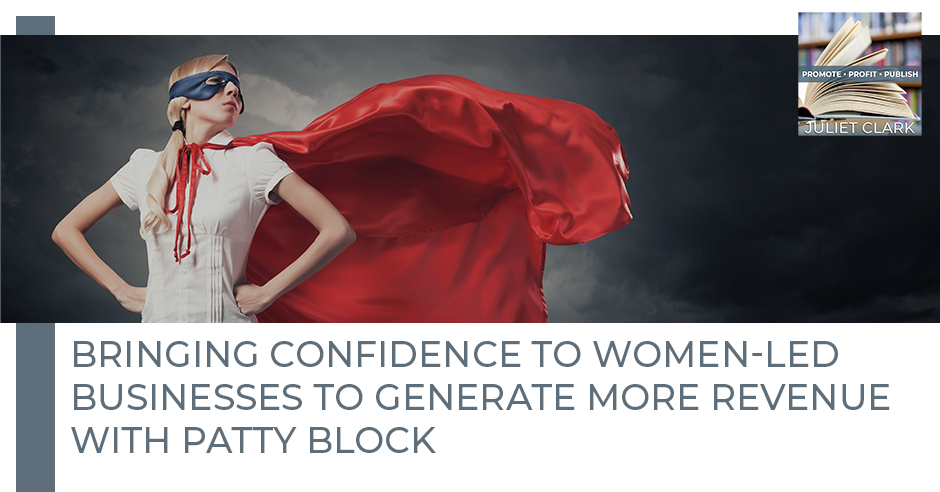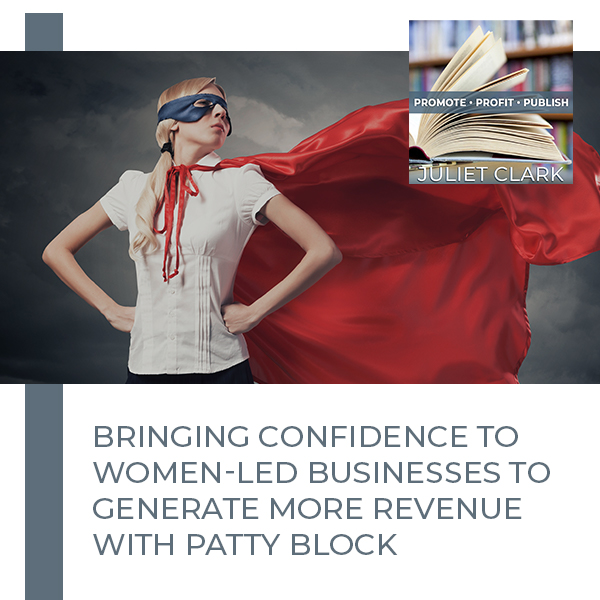
Women-led businesses won’t grow if they keep undervaluing themselves. Everyone, male or female, has inherent value. Once you stop limiting yourself, your business will begin to bloom like no other. Learn more about business development, marketing, and value-driven pricing with your host, Juliet Clark and her guest, the Founder and President of The Block Group Inc., Patty Block. Join Patty in her mission to help businesswomen all over the world generate more revenue with less stress.
—
Watch the episode here
Listen to the podcast here
Bringing Confidence To Women-Led Businesses To Generate More Revenue With Patty Block
We have another amazing guest. For you who want to know about pricing and how to talk to potential buyers, how to sell basically, hang on. Before we go there, I want to remind you to go over and take the Promote Profit Publish Quiz. You can find that at www.PromoteProfitPublishQuiz.com. Find out if you’re ready to publish because it’s not just about writing the book and slapping it up on Amazon and hoping it will sell. It’s about writing the right book and building the audience that will not only buy the book, but buy your products and services. Remember that a book is a lost leader. It’s not your big money maker. Also, if you’d like to see the videos of these episodes over on YouTube, go over and follow us, subscribe at SuperbrandPublishing.com.
Our guest is Patty Block. In 2006, Patty founded The Block Group to empower women business owners who are experts in their field. As their trusted advisor, she brings a unique perspective having experienced and solve many of the same complex issues women face as leaders, as moms, daughters and sisters. Sixty-two percent of women rely on their businesses for their primary income, yet 88% of these businesses generate less than $100,000 in annual revenue. Having seen the same struggles time and again, Patty teaches women how to shift their mindset and build confidence to generate more revenue with less stress and reimagining pricing and selling. She’s a firm believer that when women earn more, everyone around them benefits, their staff, family and community as well. Her life journey, the good and the bad, allows her to course-correct clients by leading and advising with compassion, empathy and quiet resolve.

Women-Led Businesses: As women, we soak up all kinds of information. We are very open to learning new things and putting them to work.
The result is a partnership of unbiased accountability, helping women position their companies financially, operationally, technologically for game-changing results. Patty raised three fantastic kids, all who have launched their own careers and also work in Patty’s company. She’s essentially raised her own workforce. That’s smart. I’m trying to do that. Clients often refer to Patty as their business therapist and secret weapon by establishing long-term relationships and serving as a strategic sounding board, clients experience, direct benefits to create real and lasting change, turning roadblocks into building blocks. Welcome, Patty.
Thank you. I’m glad to be here.
I love that turning roadblocks into building blocks. Why did I get the last name Dylan or Clark and not Block? I never understand why people get good names they can use in their business.
It also lends itself to graphics. I use Block in everything.
The reason I wanted you here is we have many women out there who are reading. They undervalue their programs, products and services. Can you talk a little bit about that? What’s behind that? How do you get people to transform that?
It’s something that I’ve seen for years. At first, I didn’t recognize it. I founded my company in 2006. I wanted to be that resource to empower other women business owners. I understood and understand a lot of the challenges that we deal with and the competing priorities. I started seeing these trends, one of which was we undervalue ourselves and we consistently underpriced our services. I wanted to understand that better. I started asking specific questions of my clients and colleagues, doing specific market research to understand that better and where I could fit in helping them change their thinking. That’s how my programs were born. It’s to fill that need. Part of that I realized early on, it’s not a skills issue. As women, we stoke up all kinds of information. We are very open to learning new things. We can learn those skills very quickly and put them to work. The challenge is, it’s a mindset issue. We have to change our thinking before we can have the confidence to use those skills. That’s what I recognized and started working on.
It's not bragging if it's true. Share on XI think part of it is the way we’re raised in Western culture, as women, as girls, certainly. I know that in my family, growing up, there was a lot expected of my brothers and very little expected of me, and yet I was a high achiever. I am a high achiever, very ambitious and driven. I achieved at the same levels my brothers did, but it was a different expectation from my parents and my community. I think that is part of what plays into. If you’re not raised to be the “breadwinner,” you don’t think of yourself that way. A lot of women start their businesses and generate income, in addition to what their spouse is bringing in. I know because I’ve been a single mom. I didn’t have a spouse. There was no second income, so it all fell on my shoulders. That’s a very different mindset. I think that’s part of the challenge for us as women, how we’re raised, how we move forward in our relationships, and how we think of ourselves.
I grew up with all girls and very high expectations about everything we did. As women, I think we tend to undervalue ourselves a lot. I know in marketing, I copyright, but I have a difficult time copywriting for myself. I actually write it and hand it off to my copywriter. I think that’s the same thing. As women, we don’t brag about ourselves. We don’t value a lot of things that are intrinsic with us. How does that relate when we go out and try to price ourselves?
There’s this misunderstanding about, “What I’m worth?” I’m not charging what I’m worth or people aren’t paying me what I’m worth. I bristle at that. It’s not about what you’re worth. Everyone has inherent value. It’s about building value in the mind of your buyer, finding your ideal buyer, building value, what I call perceived value, and helping your prospect understand how you can help them and what kind of results you can achieve. That’s the twist on the old way of thinking, which is I’m not charging what I’m worth.
The other thing I’ll say is, we have a saying here in Texas where I’m based, “It’s not bragging if it’s true.” That is something I hear frequently from my clients and colleagues. I feel like I’m bragging, and they feel very self-conscious. It doesn’t feel good. We’ve been taught growing up, “Don’t talk about yourself, it’s bragging. Insanely, that’s not how a young lady should behave. That’s not how a professional should behave.” My contention is it’s not bragging if it’s true. One of the things I recommend, and exactly to your point of, “It’s hard to write about yourself,” or sometimes to speak about yourself, one of the exercises I recommend for my clients is to have a trusted advisor, someone like me, or a trusted colleague, who knows you and knows your company. Ask them to write all the things that are valuable in the service that you provide. You do that for them.
You’ll be surprised, because they’ll pick out things you would never have thought of. For example, your relationships, your contacts, and connections, those are tremendous value. If you are making connections for your clients, you’ve already vetted those people or those companies. You’re saving your client’s time, energy and a lot of frustration. That’s a huge value, but we don’t often think about, talk about or include that as part of the value that we bring. That’s what you’ll find if you do this exercise with somebody that you trust. If they will pick up things that you wouldn’t have thought of, then that can be valuable.
Back to that not bragging saying, I remember growing up, my father used to say about people he heard bragging. He would turn to us kids and say, “If you have to keep telling people how good you are, maybe you aren’t that good.” That has stuck with me as well on that. There’s another thing that you indicated when we were putting your quiz together, that you hear a lot too from women is “I’m charging what the market will bear.” Talk about that.

Women-Led Businesses: Business development is building relationships.
Unless you’ve done extensive market research and you’ve talked to exactly the right people, you really have no idea what the market will bear. That is old-school thinking. Part of what I have observed over all these years is that we’ve inherited a corporate model. It’s male. It’s white. It’s very focused on how things work in a large corporation. It doesn’t necessarily fit. It’s not cookie cutter and yet, we’ve been taught it is cookie cutter. If you follow this model, this old corporate model, that is going to work in your company. In my experience, it doesn’t. It also doesn’t use the gifts that we as women have. We’re very intuitive. We’re very perceptive. We’re very creative. We stoke up what we’re learning. That old corporate model doesn’t value those things. Having a new way to look at your business, part of this mindset change is an important part because doing it the old way doesn’t work that well. There are new ways of pricing, selling, and providing your service that are much more effective. That’s what I teach.
Going back to the idea of the quiz, one of the reasons I’m interested in that whole concept is because as women, we undervalue ourselves. We tend to avoid things that are uncomfortable. Talking about our pricing is uncomfortable. Talking about ourselves is uncomfortable. Talking about an ideal buyer, even defining an ideal buyer, and then going through a sales process is very uncomfortable. Because of that, we tend to avoid, which means our companies don’t grow or they don’t grow at the rate that we’d like them to. We’re not bringing in as much revenue as we could. That means we’re limiting everything that we want to build. Everything that I talk about is about building value in your company. That’s the key, it’s how do you build value. It’s not just with pricing, but it starts with pricing.
How do you just said something important there that I’m going to bring up too? Patty and I have been talking a lot about when we brand and we market, there’s a difference between marketing and sales, quite often that branding expert gets into the essence of, “Patty is the head, the entrepreneur, the face of the company.” While that’s really important, what’s even more important is finding out the face of those buyers, knowing who you are, but also knowing who those buyers are, that appreciate that value and learning to replicate it. Can you talk a little bit about why that’s so important in selling?
You make an important distinction. I talked about the difference between marketing, business development and sales. Let me make that distinction first. Marketing, in my view, is about raising visibility. It has a place. Sometimes, it will generate leads. Marketing is very misunderstood, in my opinion. People feel as though if they market more, their business will grow. Typically, it doesn’t work like that, especially for the women I work with, who are largely technical experts in their fields. They’re CPAs, attorneys. I have one who is a biomedical engineer, and a human factors expert. People that are at that expert level, but they may not know how to run a business. They’re an expert in their field. A lot of times, they’ve come out of corporate, though they don’t know how a small business can work well. I help them with all those different aspects.
This development is building relationships. As women, we do that well. However, we tend to do that well using our intuition, perception and ability to connect people. We stumble when it comes time to close the sale, because that’s uncomfortable, asking for the sale. We tend to avoid it. We beat around the bush. We don’t want to directly ask and we don’t want to seem pushy or salesy. We spend a lot of time on business development and marketing and not enough time finding our ideal buyers and then helping them understand the value that we bring. To your question about shifting mindsets, your buyers are already segmented. They’re already shopping.
I use the example of Walmart, Macy’s and Neiman Marcus. You can buy a blouse in all three of those stores. Which woman shops in which store depends on her values, what she finds important and meaningful, how much money she has to spend, what the occasion is, how important she thinks that is. If she’s going on national television, she may want to spend more money on an expensive outfit. Those shoppers are already segmented by where they shop and so are your buyers. That means your job is figuring out where those buyers are. Having those conversations to develop the business to build those relationships that can start with marketing goes into business development and then becomes part of your sales process. Again, building that value in the mind of your buyer is a process. It’s a process that I teach because it’s not simple. It’s not what we’ve learned previously.
A mindset change is important because doing it the old way really doesn't work that well. Share on XThat also could mean having a deep dive conversation or analysis of what are the different values of those different buyers as well. My mother-in-law used to drag me off to Neiman Marcus, and I always would come home calling it needless markup. That bet, if I had to go for a high-end blouse for a TV appearance, yes, that’s where I go. It is not just identifying where that buyer is, but also what are the values of that buyer to have that conversation with them, to close that deal or any deal.
Let me add that I believe firmly there’s a price point for every buyer. When women talk about, “This is what the market will bear,” not only do they have no evidence of that, it’s a protective mechanism. We don’t have to have those uncomfortable and difficult conversations. If we believe this is what the market will bear, the problem is that keeps our company growth stunted. It’s not a factual or true statement. Helping people shift how they’re thinking so that they understand, that if I can leave behind these false ideas about what the market could bear or I shouldn’t be bragging, or all of these things that keep us stuck, and take on a more progressive way of thinking, that does use our intuition and perception and all the gifts that we have as women. We can start putting that to work for us in the sales process. It’s not uncomfortable and we won’t avoid it.
Here’s what I hear a lot. I’m going to let you turn this into a case study. I’m sure you get the same people who come in and they say, “I have a product. I’m selling at $3,500 and nobody is buying so I’m going to reduce it to $2,500. People aren’t buying it at $2,500.” Now it’s time to start looking at what is the problem here. Is that your value? Is it their value? Is it your uncomfortableness? At the end of the day, if I’m closing you, and I’m uncomfortable about the conversation, the skill and all that, the person on the other side is going to feel that, which doesn’t make them comfortable. How do you handle that hole? There was a lot to unpack there, probably that I gave you.

Women-Led Businesses: It’s not about what you’re worth. It’s about finding your ideal buyer and helping them understand your value.
There’s a lot to unpack. That’s a great question. It is something that I see and hear all the time. There’s a tendency to offer discounts, even when no one has asked for a discount. I have to say, years ago, I found myself doing it. Just having the knowledge doesn’t keep you from doing it. I knew it was not the right thing to do at the moment, but I did it anyway. It somehow felt safe or safer to be offering that discount and to lay the blame at the doorstep of, “I price this too high.” I’ve had plenty of programs that I couldn’t sell. I wondered, “I know the contents are really good, I know my stuff. I know I’m a good teacher. Why isn’t this selling?” The simplest answer is I priced it too high, but the truth of it is, I wasn’t finding the right buyers. That’s the exercise. That is so important. That is overlooked. It’s not only as you said, finding your buyers, but then building perceived value in their minds, helping them understand all the ways that you’re going to help them.
In my case, I only work with service companies. No one comes to me with a product. They come to me with a service, which is tricky because with a product, you have a supply chain, you have expenses, and you can do a calculation of how you’re building in profit. When you’re selling a service, you have none of that. One of my clients asked me, “Am I putting a price on my head? Is that what I’m doing? I’m saying this is what I’m worth?” I said “No, not at all.” I had that conversation. It’s not about what you’re worth., it’s about finding your ideal buyer and helping them understand your value, not just your value, but your stuff, your intellectual property, all the ways.
As I mentioned, your connections, all the ways that you can help and bring a solution to them and get great results. All of my clients have a track record. They can use case studies or I teach them how to create what I call reference stories that are like mini case studies, but they’re more personal. They’re about people. That’s the whole concept of building that relationship with your buyer, so that you don’t have to feel like you’re bragging. You’re sharing with them how you can help. All of my clients have a very deep sense of serving others, wanting to help and finding innovative ways to do that. To your point exactly, there’s a real misunderstanding of how we can be successful in our businesses, and what it takes to do that. Part of that is shifting the way you’re thinking so that you can leave those old ideas behind.
Patty, this has been great. I understand you have a gift. We don’t quite know what this gift is, so it’s going to be a surprise gift. Where do we get this gift?
You can go to my website, TheBlockGroup.net. We will also have a quiz and that is at WomenBuildValue.com.
Thank you so much for being on. I hope this was illuminating for you, women out there, who struggle with this. Patty has some great courses and resources to help with that. You have an entry level course that is online. Tell us a little bit about that and how it might help them.
Marketing is about raising visibility. Share on XMy signature course is called Value Driven Pricing. It’s an online program that also has a group coaching component so that I can help you customize and answer questions. We can workshop together as a group. It’s not only to shift your mindset around pricing, but also how to help you develop your pricing model and calculate what you want to price and to experiment with that. Again, no cookie-cutter approach. It’s figuring out what’s right for you and your company, and then experimenting and testing that. That program is a self-paced program with that group coaching. There’s that and then I have a second program called Painless Selling to Ideal Buyers, and that is they fit together, pricing and sales. That program is to help you have a whole new way of looking at business development and sales so that it doesn’t feel so uncomfortable. It feels more like matchmaking.
Thank you so much for being on.
Thank you. This has been great.
Important Links
- www.PromoteProfitPublishQuiz.com
- The Block Group
- Value Driven Pricing
- Painless Selling to Ideal Buyers
About Patty Block

In 2006, Patty founded The Block Group to empower women business owners who are experts in their fields. As their trusted advisor, she brings a unique perspective, having experienced and solved many of the same complex issues women face, as leaders, as moms, daughters and sisters. 62% of women rely on their businesses for their primary income, yet 88% of these businesses generate less than $100,000 in annual revenue.
Having seen the same struggles time and again, Patty teaches women how to shift their mindset and build their confidence to generate more revenue with less stress by reimagining pricing and selling. She’s a firm believer that, when women earn more, everyone around them benefits – their staff, their family and their community. Her life journey–the good and the bad–allows her to course-correct clients by leading and advising with compassion, empathy and quiet resolve. The result is a partnership of unbiased accountability, helping women position their companies–financially, operationally, technologically–for game-changing results.
Patty raised three fantastic kids, all of whom have launched their careers and also work in Patty’s company (she essentially raised her own workforce!) Clients often refer to Patty as their “business therapist” and “secret weapon.” By establishing long-term relationships and serving as a strategic sounding board, clients experience direct benefits to create real and lasting change, turning roadblocks into building blocks.
Love the show? Subscribe, rate, review, and share!









Leave A Comment